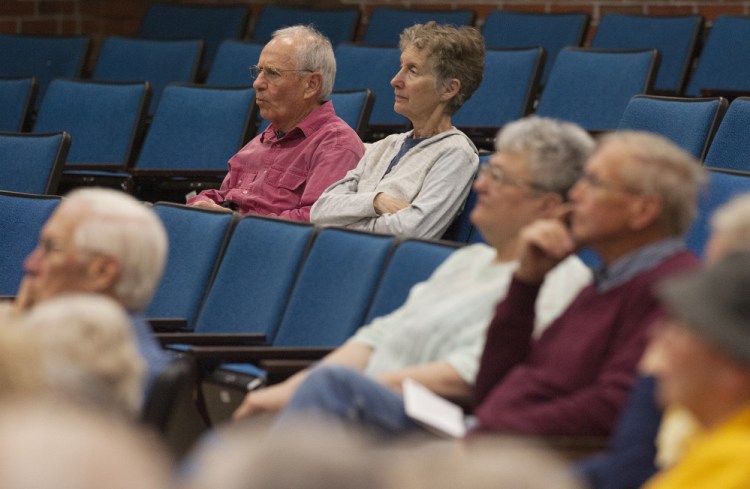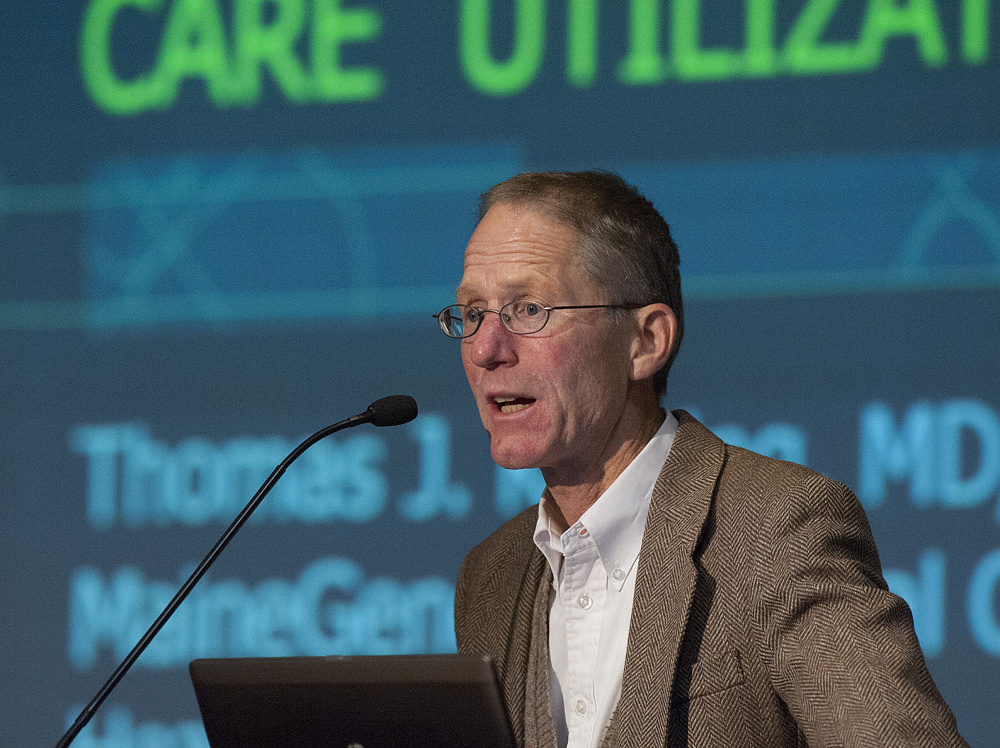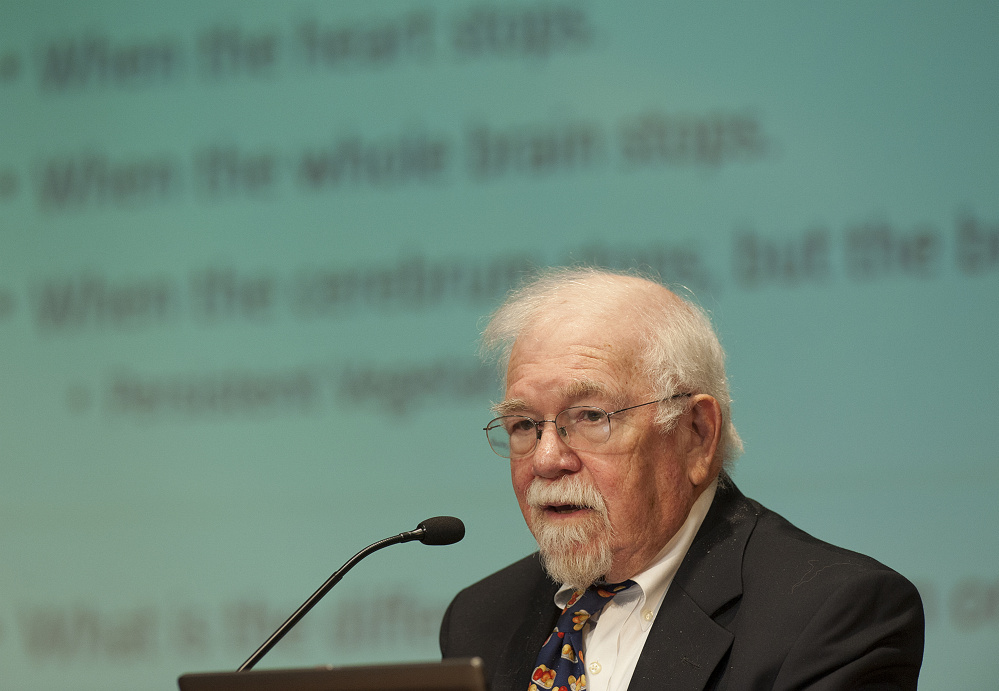AUGUSTA — Those who oppose physician-assisted suicide often do so on the slippery slope theory, the fear that once doctors are allowed to help one group of people die, other groups, perhaps even unwilling ones, could eventually wind up in the cross hairs.
But those who support assisted suicide argue that death is the most basic of self determination and free will choices, and that doctors should be allowed to help their patients through the process.
Coming down on either side raises countless issues, some of which were aired Sunday during a public forum on end-of-life care and assisted suicide at the University of Maine at Augusta.
Sen. Roger Katz, R-Augusta, one of three panelists to address the crowd of about 50 people, most advanced in years, sponsored legislation earlier this year that would have made it legal for doctors to prescribe fatal drugs to terminally ill patients wishing to die. Katz said his bill would have limited assisted suicide to those who are deemed mentally competent and then only after following specific procedures. Katz said his bill had no provision to help those who expressed a desire to die if their disease progressed to a certain point or for a host of other groups, including juveniles or those who become incapacitated. Katz acknowledged his bill, which passed in the Democrat controlled house but failed by one vote in the senate, failed to address every scenario. It was instead intended to be a starting point.
“Something like that would have been the kiss of death,” Katz said. “These things are done incrementally. Nobody objected to it because it didn’t go far enough.”
Katz was joined on the panel by Doctors Thomas Keating, medical director for Hospice of Southern Maine, and Tom Feagin, described as an expert in medical ethics. Keating, who expressed ambivalence about physician-assisted suicide, said it was necessary to limit the scope of assisted suicide to prevent killing someone who may not wish to die, but the limits also create inequity. For instance, a cancer patient who wishes to die likely would have fallen into the legislation Katz proposed, but an Alzheimer patient with an altered mental state might not have.
“It seems inherently discriminatory,” Keating said. “Just to make sure you have those safeguards, you’re leaving out a big category of people.”
Suicide is not the only cure for suffering. Keating said palliative care, which works to reduce the symptoms, can offer patients relief whether their suffering is because of the end stages of a terminal illness or because of curative treatment. That relief, unlike assisted suicide, is available to everyone.
“It’s the medical specialty that focuses on quality of life rather than quantity of life,” Keating said. “We do anything to lengthen your life, not to shorten it.”
Feagin said every illness in every patient can bring with it a host of ethical questions when it comes to making end-of-life decisions. A person used to be considered dead when their heart stopped beating, Feagin said, but now that determination is often reserved for when there is no brain activity. Sometimes even that is uncertain if the person is kept alive on life support or if there is activity in a part of the brain.
“Death is complicated,” he said.
Feagin, who believes people “should have the help to end their life if they need to,” acknowledged that those decisions are complicated by myriad uncertainties. He raised questions: When is someone terminally ill? If they have six months to live? What if they have two years? And what is suffering? How much suffering must someone experience before their doctor is allowed to help them die?
“Where do you stop?” Feagin asked. “How do you know when it’s OK?”
Katz, who modeled his proposal after legislation passed in Oregon 16 years ago, said he sponsored his bill after the death of his parents and other relatives. Katz said the death of Brittany Maynard, who last year made national headlines by publicizing her decision to make use of Oregon’s right-to-die law after developing brain cancer, crystallized Katz’ resolve to introduce the legislation.
“A competent adult ought to have control over his or her life generally free from government interference,” he said. “It’s about the right to choose one’s own path.”
But Katz acknowledged there were significant objections to assisted suicide for religious reasons and fears that the decision could be motivated by costs of care or that the disabled may become targets.
“All of those are legitimate concerns,” Katz said. “The slippery slope is something we all ought to be worried about.”
But, Katz said, those concerns have not played out in Oregon, where about 1,300 people have been granted approval for assisted suicide in the past 16 years. Only about 800 of those people have actually taken the pills to die.
“The abuses people are legitimately concerned about just haven’t panned out in Oregon,” Katz said.
Polling suggests that about 70 percent of the population favor physician-assisted suicide, Katz said. Nobody at Sunday’s forum spoke out publicly against assisted suicide, and Clair Rowe, who in June moved to Maine from Oregon, said she had always been comforted by the knowledge that she could get help ending her life should she develop a terminal illness.
“I’m amazed how much I’ve felt my anxiety go up just because the law does not exist here,” Rowe said.
Katz, who likened the effort to pass an assisted-suicide law in Maine to gay marriage, which ultimately won voter approval after initial rejection, promised to reintroduce the bill in 2017 if he is re-elected to the senate.
Greg Fahy, who teaches philosophy at UMA, in referring to Katz’ claim that the law would expand incrementally once introduced, questioned whether that was the slippery slope that opponents feared. He asked how the bill could be expanded without the danger of going too far.
“Where do we draw that line?” Fahy asked.
Craig Crosby — 621-5642
Twitter: @CraigCrosby4
Send questions/comments to the editors.





Success. Please wait for the page to reload. If the page does not reload within 5 seconds, please refresh the page.
Enter your email and password to access comments.
Hi, to comment on stories you must . This profile is in addition to your subscription and website login.
Already have a commenting profile? .
Invalid username/password.
Please check your email to confirm and complete your registration.
Only subscribers are eligible to post comments. Please subscribe or login first for digital access. Here’s why.
Use the form below to reset your password. When you've submitted your account email, we will send an email with a reset code.